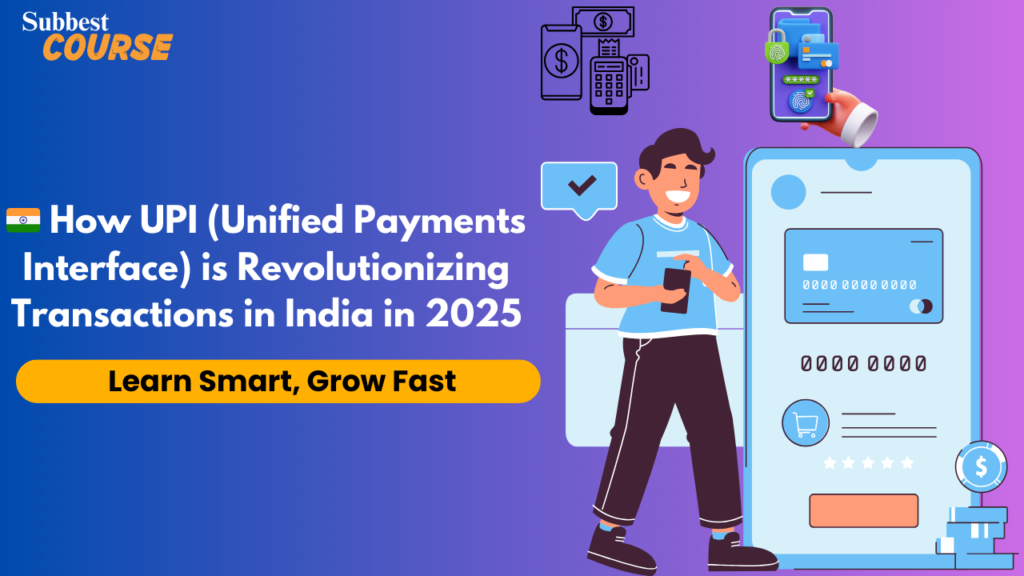Introduction
In the last few years, UPI (Unified Payments Interface) has completely transformed how Indians send and receive money. Whether you’re paying at a tea stall or shopping online, UPI has become the default payment method for millions of Indians — fast, free, and frictionless.
With over 10 billion transactions per month and rising adoption across every corner of India, UPI is not just a payment system — it’s a revolution in India’s digital economy.
In this blog, we’ll explore how UPI is changing the game, its growth, features, and future in the Indian financial ecosystem.

Introduction
In the last few years, UPI (Unified Payments Interface) has completely transformed how Indians send and receive money. Whether you’re paying at a tea stall or shopping online, UPI has become the default payment method for millions of Indians — fast, free, and frictionless.
With over 10 billion transactions per month and rising adoption across every corner of India, UPI is not just a payment system — it’s a revolution in India’s digital economy.
In this blog, we’ll explore how UPI is changing the game, its growth, features, and future in the Indian financial ecosystem.
UPI Growth in India: Key Statistics
| Year | UPI Transactions (Volume) | Total Value (INR) |
|---|---|---|
| 2018 | 0.9 Billion | ₹1.09 Trillion |
| 2020 | 12.5 Billion | ₹21.3 Trillion |
| 2022 | 45 Billion | ₹84 Trillion |
| 2024 | 110 Billion+ | ₹182 Trillion |
UPI grew over 2000% in just 5 years, becoming the world’s largest real-time payment system.
Why UPI is a Game-Changer for India
1. Zero Cost, Instant Transfers
No extra fees for transferring money — even across banks. Transactions are processed in real time within seconds.
2. Financial Inclusion
UPI has reached rural India, helping people without credit cards or laptops to make digital payments using just a smartphone.
3. 24×7 Availability
UPI works round the clock, even on weekends or bank holidays.
4. No Need for Cards or Cash
No need to carry cash or debit cards — everything is done via your mobile phone.
5. Secure & Trusted
With 2-factor authentication, OTPs, and PIN-based verification, UPI is a highly secure platform regulated by the RBI and NPCI.
UPI in Daily Life: Real-World Impact
- Street vendors now accept UPI via QR codes
- Small shops use UPI instead of POS machines
- Even auto-rickshaw drivers use UPI for fares
- Parents send pocket money via UPI
- Utility bill payments, rent transfers — all through UPI
Even offline UPI payments are now possible via missed call or offline QR, making it usable in poor network areas.
Security Features of UPI
- PIN-based authentication
- Device binding for app access
- Auto-blocking of suspicious transactions
- Instant transaction history and alerts
Still, users must be cautious and never share PINs, OTPs, or install unknown apps claiming to be UPI-related.
UPI Goes Global: International Expansion
UPI is not just limited to India anymore. NPCI has started global expansion:
- Accepted in UAE, Singapore, France, Bhutan, Sri Lanka
- Real-time cross-border transactions being tested
This positions UPI as a global financial tech innovation from India.
Future of UPI in India (2025 & Beyond)
- UPI Credit: Pay later options linked with UPI are expanding
- Voice-based UPI: Especially for illiterate or rural users
- UPI for Businesses: Automating salary, invoice, and vendor payments
- AI & UPI: AI chatbots helping users transact via voice or chat
- UPI and Blockchain: Safer, faster, and transparent transactions
Conclusion
UPI is more than just a money transfer system. It’s India’s digital backbone that is enabling financial empowerment, business digitization, and economic growth. From chaiwalas to CEOs — everyone uses UPI.
As we move into 2025, UPI will play an even bigger role in India’s vision of a Digital Bharat.